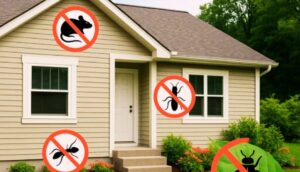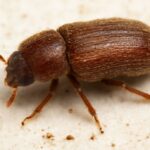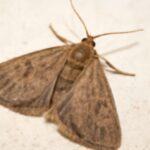Easy DIY methods to banish ants and protect your kitchen naturally

If you’ve ever walked into your kitchen and spotted a long trail of ants marching across the counter, you know how frustrating it can feel. Ants are small but persistent. Once they discover a food source, they bring their friends, and suddenly your kitchen feels invaded.
The good news? You don’t need harsh chemicals to send them packing. There are many natural, safe, and effective ways to get rid of ants in the kitchen. These solutions not only protect your food and family but also keep your space fresh and healthy.
In this guide, you’ll learn exactly how to get rid of ants in the kitchen naturally. We’ll cover why ants invade, simple prevention tips, natural remedies, and even answers to the most common questions homeowners ask.
Why Ants Invade the Kitchen
Ants aren’t here to annoy you; they’re on a mission for food and water. Your kitchen offers both in abundance, crumbs on the floor, sugary spills on the counter, or even a pet food bowl left out overnight, which can attract them.
Here are the main reasons ants march into your kitchen:

-
Spills or food crumbs – Even small amounts of sugar granules encourage the presence of ants.
-
Standing water – Leaky faucets or wet sponges are enough to attract ants.
-
Easy access points – Cracks, gaps in windows, or tiny holes in walls.
-
Scouting behavior – One ant finds food and leaves a chemical trail for others.
Understanding why ants enter your kitchen is the first step to stopping them naturally.
How To Get Rid Of Ants In The Kitchen Naturally
Let’s explore effective, chemical-free ways to deal with ants once and for all.
1. Keep the Kitchen Spotless
Ants follow food trails. Wipe counters after meals, sweep crumbs off the floor, and clean up spills immediately. Be extra attentive to sugary substances, which are some of ants’ favorites.
2. Store Food in Airtight Containers
Dry goods like sugar, cereal, and flour should be stored in sealed containers. This makes it nearly impossible for ants to smell and access them.
3. Use White Vinegar Spray
Vinegar disrupts the ants’ scent trails. Mix equal parts white vinegar and water in a 32-oz spray bottle. Spray along countertops, entry points, and wherever you see ants. It’s safe, natural, and effective.
4. Try Lemon Juice
Like vinegar, lemon juice masks scent trails. Spray it around doorways, windowsills, or cracks. Plus, the citrus scent leaves your kitchen smelling fresh.
5. Sprinkle Cinnamon or Cloves
Ants dislike the strong smell of cinnamon and cloves. Sprinkle these spices near entry points or set small bowls around problem areas. It acts as a natural barrier.
6. Use Diatomaceous Earth (Food-Grade)
This powder is harmless to humans and pets but will eliminate ants. It works by dehydrating them. Lightly dust it around cracks, baseboards, or under appliances where ants travel.
7. Lay Down Cucumber or Citrus Peels
Ants avoid cucumbers and citrus. Place fresh peels around entry points or in corners where ants are active. Replace them every couple of days.
8. Create a Soap and Water Solution
A simple mix of dish soap and water can kill ants on contact. Fill a spray bottle and use it whenever you see active trails.
9. Seal Entry Points
Check walls, windows, and door frames for cracks. Seal them with caulk to block ants from sneaking in again.
10. Remove Standing Water
Fix leaks, wipe down sinks, and empty pet water bowls overnight. Ants need moisture to survive, so removing it makes your kitchen less appealing.
Natural Prevention Tips
Once you’ve controlled ants, it’s time to prevent them from returning. Prevention is always easier than battling another full-blown invasion.

-
Take out trash daily.
-
Rinse recyclables before placing them in bins.
-
Keep pet food dishes clean.
-
Run the dishwasher promptly instead of letting dirty dishes sit.
-
Vacuum and mop floors regularly.
These small habits go a long way in keeping ants away naturally.
Infographic Chart: Natural Ant Removal Methods
10 Natural Ways to Rid Your Kitchen of Ants
| Method | Natural Ingredient | How It Works |
|---|---|---|
| Vinegar Spray | White Vinegar | Disrupts scent trails |
| Lemon Juice | Lemon | Masks food trails, repels ants |
| Cinnamon & Cloves | Spices | Strong smell repels ants |
| Diatomaceous Earth | Food-grade DE | Dehydrates ants |
| Cucumber/Citrus Peels | Fresh produce | Natural repellent barrier |
| Soap & Water Solution | Dish Soap | Kills ants on contact |
| Airtight Containers | Jars & storage | Blocks food access |
| Spotless Kitchen | Cleaning routine | Removes food sources |
| Sealed Entry Points | Caulk | Blocks ant access |
| Remove Standing Water | Dry surfaces | Eliminates the moisture source |
Download Your Free PDF Checklist to Manage Ants
10 Frequently Asked Questions About Natural Ant Control
1. Why do ants always come back after I clean?
The habit of ants is to leave a scent trail for others to follow. Even after cleaning, if a small part of the trail remains, they return. That’s why vinegar or lemon spray is key—it erases the trail.
2. Is vinegar safe to spray on kitchen counters?
Yes. White vinegar can be used for most kitchen surfaces. Just avoid marble or natural stone since it can damage them.
3. How fast do natural methods work?
Some, like soap spray, kill ants instantly. Others, like diatomaceous earth or lemon juice, may take a few days to show full results.
4. Can I use essential oils against ants?
Yes. Peppermint, tea tree, and eucalyptus oils work well. Mix several drops of peppermint with water and spray around points of entry.
5. Are natural ant control methods safe for pets?
Most are safe. However, keep pets away from strong essential oils or large amounts of diatomaceous earth to avoid irritation.
6. Do ants cause harm in the kitchen?
Generally, ants don’t carry major diseases. But they can contaminate food, which makes them a nuisance and a hygiene issue.
7. What’s the difference between sugar ants and regular ants?
Sugar ants specifically hunt sweet foods, while other species may go after grease, protein, or moisture. The natural remedies in this guide work for both.
8. How to prevent ants from entering through cracks?
Seal gaps with caulk, weather stripping, or door sweeps. Pair that with natural repellents near entry points.
9. Can natural methods replace professional pest control?
For minor infestations, yes. But if you have a large colony inside your walls, calling a professional may be necessary.
10. Do natural methods last as long as chemical sprays?
Not always. Natural remedies often require reapplication. However, they’re safer, eco-friendly, and perfect for everyday kitchen use.
Conclusion
Ants in the kitchen can be annoying, but you don’t need toxic sprays to solve the problem. With natural solutions like vinegar, lemon juice, cinnamon, and diatomaceous earth, you can eliminate ants safely. Discourage the presence of ants through keeping your kitchen clean, storing dry food items in airtight containers, and ensuring that all entry points are sealed
The key takeaway? A combination of natural remedies and simple habits is the best way to get rid of ants in the kitchen naturally—and keep them from returning.
Your kitchen should be a space for cooking, eating, and making memories—not battling ants. With these tips, you can reclaim your space and enjoy a pest-free, fresh, and welcoming kitchen.









